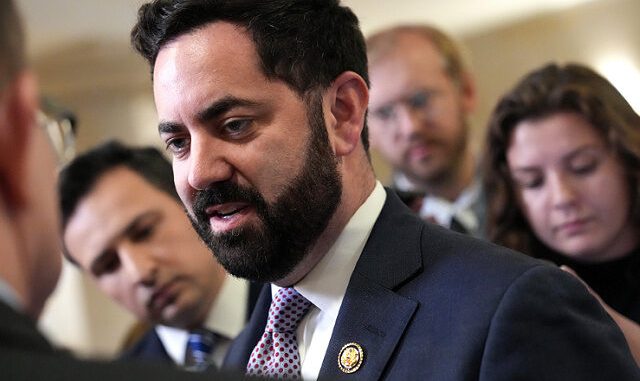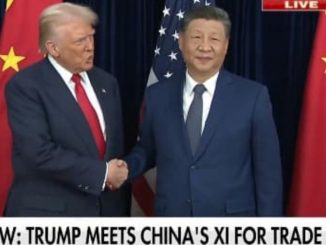
Published September 5, 2025
Rep. Mike Lawler (R-NY) on Thursday spearheaded a congressional letter to President Donald Trump urging him to block Iranian regime officials from entering the United States for the upcoming United Nations General Assembly in New York, warning, “They are criminals. They support terrorism. They sow hatred and instability across the Middle East.”
On September 4, 2025, Rep. Mike Lawler (R-NY) led a bipartisan group of 40 lawmakers in urging President Donald Trump to deny Iranian officials visas to attend the upcoming United Nations General Assembly in New York. The lawmakers condemned Iran’s recent human rights violations and support for terrorism, describing the regime as “criminals” who “sow hatred and instability across the Middle East.”
The letter highlights the Iranian government’s violent crackdown following a 12-day war with Israel, which included the arbitrary arrest of hundreds of ethnic minorities, civil society leaders, and women’s rights activists. Additionally, the regime executed two members of an opposition political party and placed over a dozen others on death row. Under President Masoud Pezeshkian’s leadership, nearly 1,500 people have been executed in one year, with some officials openly calling to replicate the 1988 massacre of 30,000 political prisoners.
The lawmakers argue that allowing Iran’s delegation to use the U.N. platform would enable the regime to present a deceptive image of moderation. They urge President Trump to restrict the delegation’s freedom of movement and, where possible, refrain from issuing visas to key members, including President Pezeshkian.
This call aligns with the Trump administration’s previous actions, such as denying visas to Palestinian Authority officials seeking statehood recognition and blocking Palestinian leaders from entering the U.S.
👥 Public/Political Reactions
The recent bipartisan letter spearheaded by Rep. Mike Lawler (R-NY), urging President Donald Trump to deny Iranian officials visas for the upcoming United Nations General Assembly, has elicited a range of reactions from both the public and political spheres.
Public Reactions
Public sentiment on the issue appears divided. Some individuals express support for the lawmakers’ stance, viewing it as a necessary measure to hold Iran accountable for its actions. For instance, Joshua Klein, a social media user, shared the Breitbart article detailing the lawmakers’ call, indicating interest in the topic.
Conversely, others criticize the approach, arguing that it may hinder diplomatic efforts and escalate tensions unnecessarily. These critics suggest that engagement through international platforms like the U.N. could be more effective in addressing concerns with Iran.
Political Reactions
Republican Support:
The letter has garnered support from several Republican lawmakers, including Rep. Nancy Mace (R-SC), Rep. Anna Paulina Luna (R-FL), and Rep. Elise Stefanik (R-NY). They align with Rep. Lawler’s position, emphasizing the need to prevent Iran from using the U.N. platform to project a misleading image of moderation.
Democratic Opposition:
On the Democratic side, reactions are more critical. Some Democrats argue that such measures could further isolate Iran and reduce opportunities for diplomatic engagement. They caution against actions that might escalate tensions without clear benefits.
International Perspectives:
International reactions to the U.S. lawmakers’ call are not yet fully documented. However, global leaders have previously expressed concern over U.S. foreign policy decisions related to Iran. For example, following President Trump’s military strikes on Iranian nuclear facilities, leaders from countries like France and Oman called for diplomatic solutions and expressed deep concern over escalating tensions.
 Resulting Effects
Resulting Effects
1. Strengthened U.S. Security Posture
-
Denying visas signals a firm stance against a regime known for terrorism and human rights abuses.
-
Sends a message that the U.S. will not tolerate nations that threaten American interests or destabilize the Middle East.
2. Accountability for Iran
-
Prevents Iran from using the U.N. platform to whitewash its actions or present a misleading image of moderation.
-
Highlights the U.S.’s commitment to standing up for oppressed groups, such as ethnic minorities and women targeted by the Iranian regime.
3. Domestic Political Gains
-
Positions Republican lawmakers as strong defenders of U.S. national security and principled foreign policy.
-
Appeals to constituents who favor tough policies against hostile foreign powers.
4. Reinforced International Deterrence
-
Shows other nations that violations of human rights and sponsorship of terrorism carry diplomatic consequences.
-
Strengthens the credibility of U.S. leadership in taking decisive action, potentially deterring future aggression by adversarial states.
5. Support for U.S. Allies
-
Reassures Israel and other regional allies that the U.S. will actively counter Iranian aggression.
-
Demonstrates solidarity with nations threatened by Iran’s destabilizing activities, bolstering regional security cooperation.
🔮 Future Outlook
1. Continued Pressure on Iran
-
The U.S. is likely to maintain a hardline stance, using visa restrictions and diplomatic isolation as leverage to curb Iran’s nuclear ambitions and regional aggression.
-
This pressure may force Iran to reconsider overt acts of terrorism, human rights violations, and regional destabilization.
2. Strengthened U.S. Global Leadership
-
By taking decisive action, the U.S. reinforces its image as a nation that prioritizes security, human rights, and accountability on the world stage.
-
Other nations may follow suit in imposing targeted sanctions or diplomatic restrictions on rogue regimes.
3. Political Capital for Conservative Lawmakers
-
Republican lawmakers advocating for this policy may gain credibility and public support for being tough on hostile foreign actors.
-
This could influence future foreign policy debates in Congress, making strong stances against adversarial regimes a central platform for right-leaning politicians.
4. Reinforced Alliances in the Middle East
-
Regional allies like Israel, Saudi Arabia, and the UAE may view U.S. actions as a protective and stabilizing force.
-
Strengthened alliances could lead to increased intelligence-sharing, military cooperation, and coordinated pressure on Iran.
5. Potential Long-Term Isolation of Iran
-
If continued, these policies may marginalize Iran diplomatically, limiting its ability to form alliances or influence global forums.
-
Over time, economic and political isolation could weaken the regime’s ability to fund terrorism and suppress internal dissent.
 Bottom Line:
Bottom Line:
Blocking Iranian officials from attending the U.N. General Assembly represents a decisive step in holding a rogue regime accountable. By denying visas and restricting access, the U.S. asserts its commitment to security, human rights, and global stability. This strong stance not only sends a clear message to Iran but also reassures allies in the Middle East that the United States will actively counter aggression and terrorism. For lawmakers and citizens who prioritize national security and principled foreign policy, this action underscores the importance of standing firm against regimes that threaten peace and stability.
SOURCES: BREITBART – Rep. Mike Lawler, Lawmakers Call on Trump to Bar Iran U.N. Visit: ‘They Are Criminals Who Fuel Terrorism’





Be the first to comment